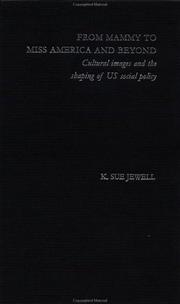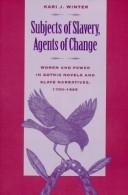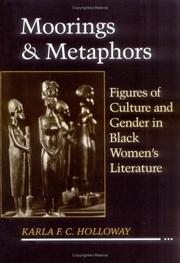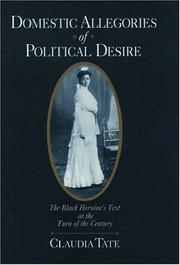| Listing 1 - 6 of 6 |
Sort by
|

ISBN: 0415042534 Year: 1992 Publisher: New York Routledge
Abstract | Keywords | Export | Availability | Bookmark
 Loading...
Loading...Choose an application
- Reference Manager
- EndNote
- RefWorks (Direct export to RefWorks)
Book
ISBN: 0899507301 Year: 1992 Publisher: Jefferson ; London McFarland
Abstract | Keywords | Export | Availability | Bookmark
 Loading...
Loading...Choose an application
- Reference Manager
- EndNote
- RefWorks (Direct export to RefWorks)
Book
ISBN: 0151731527 Year: 1992 Publisher: New York (N.Y.): Harcourt, Brace and Jovanovich
Abstract | Keywords | Export | Availability | Bookmark
 Loading...
Loading...Choose an application
- Reference Manager
- EndNote
- RefWorks (Direct export to RefWorks)
Abused women --- African American women --- Female circumcision --- Women immigrants --- Immigrant women --- Immigrants --- Circumcision, Female --- Clitoridotomy --- Female genital cutting --- Female genital modification --- Female genital mutilation --- FGC (Female genital cutting) --- FGM (Female genital mutilation) --- Genital cutting, Female --- Genital mutilation, Female --- Mutilation, Female genital --- Body marking --- Clitoris --- Initiation rites --- Afro-American women --- Women, African American --- Women, Negro --- Women --- Battered women --- Victims of crimes --- Battered woman syndrome --- Surgery --- Africa. --- Eastern Hemisphere --- Africa

ISBN: 082031420X 9780820314204 Year: 1992 Publisher: Athens, GA : University of Georgia Press,
Abstract | Keywords | Export | Availability | Bookmark
 Loading...
Loading...Choose an application
- Reference Manager
- EndNote
- RefWorks (Direct export to RefWorks)
In Subjects of Slavery, Agents of Change Kari J. Winter compares the ways in which two marginalized genres of women's writing - female Gothic novels and slave narratives - represent the oppression of women and their resistance to oppression. Analyzing the historical contexts in which Gothic novels and slave narratives were written, Winter shows that both types of writing expose the sexual politics at the heart of patriarchal culture and both represent the terrifying aspects of life for women. Female Gothic novelists such as Emily and Charlotte Bronte, Ann Radcliffe, and Mary Shelley uncover the terror of the familiar - the routine brutality and injustice of the patriarchal family and of conventional religion, as well as the intersecting oppressions of gender and class. They represent the world as, in Mary Wollstonecraft's words, "a vast prison" in which women are "born slaves." Writing during the same period, Harriet Jacobs, Nancy Prince, and other former slaves in the United States expose the "all-pervading corruption" of southern slavery. Their narratives combine strident attacks on the patriarchal order with criticism of white women's own racism and classism. These texts challenge white women to repudiate their complicity in a racist culture and to join their black sisters in a war against the "peculiar institution." Winter explores as well the ways that Gothic heroines and slave women resisted subjugation. Moments of escape from the horrors of patriarchal domination provide the protagonists with essential periods of respite from pain. Because this escape is never more than temporary, however, both types of narrative conclude tensely. The novelists refuse to affirm either hope or despair, thereby calling into question conventional endings of marriage or death. And although slave narratives were typically framed by white-authored texts, containment of the black voice did not diminish the inherent revolutionary conclusion of antislavery writing. According to Win ter, both Gothic novels and slave narratives suggest that although women are victims and mediators of the dominant order they also can become agents of historical change.
American literature --- Slaves --- English fiction --- Slaves' writings, American --- Women and literature --- Horror tales, English --- Gothic revival (Literature) --- Power (Social sciences) in literature --- African American women in literature --- Sex role in literature --- American slaves' writings --- Enslaved persons --- Persons --- Slavery --- English literature --- Afro-American women in literature --- Agrarians (Group of writers) --- Women authors&delete& --- History and criticism --- Biography&delete& --- Intellectual life --- Women authors --- Biography --- American enslaved persons' writings

ISBN: 0813557585 0585002657 9780585002651 0813517451 081351746X 9780813557588 Year: 1992 Publisher: [Place of publication not identified] Rutgers University Press
Abstract | Keywords | Export | Availability | Bookmark
 Loading...
Loading...Choose an application
- Reference Manager
- EndNote
- RefWorks (Direct export to RefWorks)
American literature --- Women and literature --- African American women in literature --- Women, Black, in literature --- Sex role in literature --- Myth in literature --- Metaphor --- West African literature (English) --- Comparative literature --- Women --- English --- Languages & Literatures --- American Literature --- Parabole --- Figures of speech --- Reification --- Human females --- Wimmin --- Woman --- Womon --- Womyn --- Females --- Human beings --- Femininity --- Literature --- English literature --- Agrarians (Group of writers) --- Literature, Comparative --- Philology --- Afro-American women in literature --- History and criticism --- African American authors --- Women authors --- American and West African (English) --- West African (English) and American --- History --- Intellectual life

ISBN: 0195073894 019536080X 1280526084 1429405570 Year: 1992 Publisher: New York Oxford University Press
Abstract | Keywords | Export | Availability | Bookmark
 Loading...
Loading...Choose an application
- Reference Manager
- EndNote
- RefWorks (Direct export to RefWorks)
Domestic fiction, American --- American fiction --- African American women --- Politics and literature --- Women and literature --- African American women in literature. --- Heroines in literature. --- Marriage in literature. --- Desire in literature. --- Allegory. --- History and criticism. --- African American authors --- Women authors --- Intellectual life. --- African American women in literature --- Afro-Amerikaanse vrouwen in de literatuur --- Allegorie --- Allegory --- Allégorie --- Begeerte in de literatuur --- Desire in literature --- Désir dans la littérature --- Femmes afro-américaines dans la littérature --- Heldinnen in de literatuur --- Heroines in literature --- Huwelijk in de literatuur --- Héroïnes dans la littérature --- Mariage dans la littérature --- Marriage in literature --- Fiction --- Thematology --- American literature --- Literature --- Literature and politics --- Heroines --- Personification in literature --- Symbolism in literature --- Afro-American women --- Women, African American --- Women, Negro --- Women --- Afro-American women in literature --- Intellectual life --- African American authors&delete& --- History and criticism --- Women authors&delete& --- Political aspects --- Domestic fiction [American ] --- United States --- Hopkins, Pauline Elizabeth --- Criticism and interpretation --- Harper, Frances Ellen Watkins --- Grimké, Angelina Weld --- Jacobs, Harriet Ann --- Kelley, Emma Dunham --- Johnson, Amelia E. --- Tillman, Katherine Davis Chapman --- Littérature américaine --- Histoire et critique --- Littérature américaine
| Listing 1 - 6 of 6 |
Sort by
|

 Search
Search Feedback
Feedback About UniCat
About UniCat  Help
Help News
News